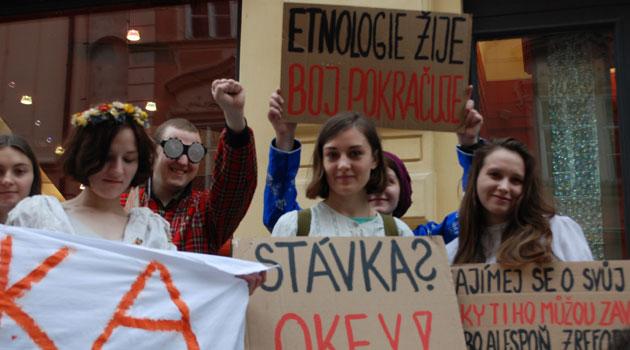Changes at Czech university revive longstanding dispute about the existence of the Romani ethnicity

The Faculty of Arts of one of Europe’s oldest universities, Charles University in Prague, is undergoing significant changes thanks to the leadership of its current Dean. Some members of the academic community are strongly objecting to some of those changes; a petition has been put together and ethnology students are on strike.
Is this a conservative, well-entrenched environment defending itself against changes that are disrupting its calm life, against the risk that the ongoing changes will actually endanger it? The most contentious situation is that of the Institute of Ethnology, thanks to the topic of the ethnicity of the Romani minority, which is again being heard in discussions around the current events at the Czech Government Agency for Social Inclusion and its changes.
In February 2014, Docent Mirjam Friedová became the historically first female Dean of the Faculty of Arts at Charles University in Prague. This leading Czech linguist, who holds a PhD from the University of California at Berkeley, led the Linguistics Department before being appointed Dean.
Friedová has now begun to focus on stabilizing the financing of the faculty and on generational transitions aiming to maintain the continuity of instruction, research, and collaboration with institutions abroad. The changes the faculty is undergoing will gradually affect all departments and institutes and are sparking a response.
The March session of the Academic Senate lasted a record seven hours due to the significance and topicality of the changes. The leaders of various institutes at the faculty have long been grappling with reduced budgets thanks to the faculty’s mediocre economic situation, which is naturally reflected at the level of personnel – hours are being cut and staff are being assigned to lower pay grades or dismissed.
Students are also speaking up – they do not like the fact that these changes are interfering with course availability or that the educators with whom they are studying, writing their theses and taking their exams are now leaving. The neglected state of the Institute of Ethnology has long been debated and is supposed to be changed by its new leader, appointed in October 2014, an anthropologist from the University of Plzeň, Marek Jakoubek.
His hiring sparked a wave of negative reactions from the academic community both at home and abroad, with those opposed to him primarily referencing an argument conducted with him by ethnology and Romani Studies experts in 2008 in the journal Český lid (The Czech People) where the core of the dispute was his perspective on the Romani ethnicity in particular. This is a topic which is resonating once more in the current discussions around what is happening at the Czech Government Agency for Social Inclusion, a debate sparked by the recent removal of its director, Martin Šimáček, by Czech Human Rights Minister Jiří Dienstbier.
The concept that Docent Jakoubek presented for developing the Institute and its studies won out over the proposals made by 11 other candidates; his proposal counted from the beginning on changing the staff and soon became the target of criticism. At the start of 2015 five educators were let go from the Institute and other dismissals are planned.
Some of the current educators, graduates and students of the department have objected most strenuously to the departure of the anthropologists Jaroslav Skupnik and Martin Soukup. The leadership of the faculty has received two petitions disagreeing with their dismissal, one with approximately 220 signatures of students and the general public, and another signed by 31 graduates of the Institute.
In addition to emphasizing the expertise and teaching experience of the dismissed academics, the authors of the petitions warned that there may have been personal reasons for their dismissals, as they have long been critics of Jakoubek. The Academic Senate has also called on the Dean to keep both anthropologists at the Institute.
The Dean, however, is a staunch supporter of the director’s decision to dismiss them and does not consider the arguments made in their defense to be relevant. Jakoubek has justified the dismissals by saying the anthropologists have placed too little emphasis on grant activity and publication, and has also said their research interests are part of the decision to let them go.
The director of the Institute rejects allegations that there are personal reasons for their dismissal. Some ethnology students began a two-day strike on Wednesday, 6 May in order to draw attention to this situation by protesting and demanding the director be removed.
The students say they agree with the need for a new direction at the department, but object to the way it is being rolled out under the leadership of Docent Jakoubek. They have also expressed concern over whether their studies will be preserved; the original plan that both of the dismissed educators would be able to continue supervising their students’ graduate work after their departure has been overturned by the faculty leadership, who claim they are prepared for this situation.